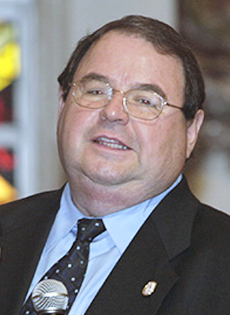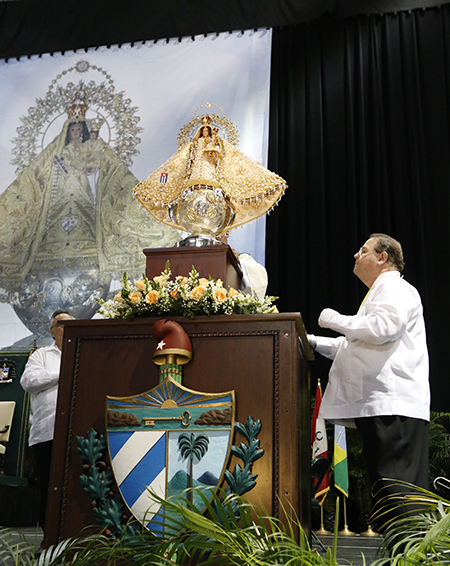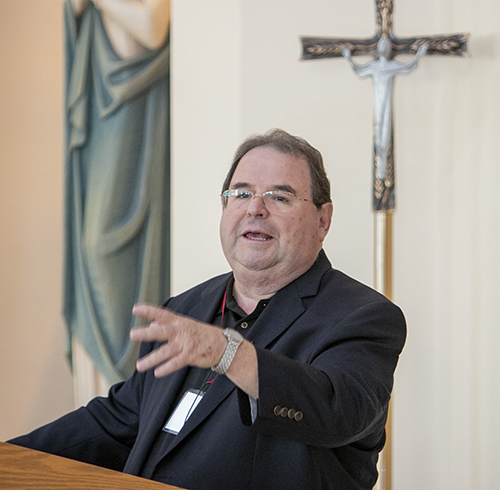By Ana Rodriguez Soto - The Archdiocese of Miami

Rogelio Zelada: Dec. 5, 1944-Jan. 21, 2023.
MIAMI | The final goodbye to Rogelio Zelada will take place in his second home: the house of his beloved Our Lady of Charity, whose image he faithfully cared for over three decades and to whom he wrote one of the best-known compositions of the Cuban Church: "Virgen Mambisa."
Zelada died early in the morning of Jan. 21, 2023 at his home in Miami, due to a cancer that was diagnosed several years ago. He had just turned 78, and almost all his life had been dedicated to the Church in Cuba, Puerto Rico and Miami.
His funeral will take place at the National Shrine of Our Lady of Charity – better known as la Ermita de la Caridad – this Saturday, Jan. 28, starting with a viewing at 10 a.m., followed by a funeral Mass at 11:30 a.m.
“Someone told me today, the shrine might not be large enough for his funeral Mass,” said Father Juan Sosa, pastor of St. Joseph on Miami Beach, who brought Zelada to the Archdiocese of Miami in 1987 to work with him in the Office of Worship and Spiritual Life.
That’s because Zelada was well-known among the Spanish-speaking laity of the archdiocese. And not for having written the lyrics of Virgen Mambisa, whose musical composer was Orlando Rodríguez.
Zelada was the favorite teacher of hundreds of lay ministers and extraordinary ministers of the Eucharist in South Florida and other regions of the U.S., whom he taught for more than three decades as a professor in the Office of Worship, at the Southeast Pastoral Institute (SEPI), and in the Lay Ministry program.
Along with his daily work in those offices, Zelada spent nights and weekends teaching in parishes that called on him even after he retired in 2020, when he was already battling cancer. He gladly taught those classes. And those who heard him were fascinated, reluctant to let the sessions end.
“To sit with Rogelio was to open a book. But more than that, he cleared everything up,” said Fior Ramirez, who met Zelada when he began working at the archdiocese and she worked in the Office of Catechesis. They and several other colleagues would have lunch together.
“He was a walking encyclopedia,” said Ramirez. “Rogelio taught a class and he never had to look at his notes. He would switch from history to theology to liturgy like he was exchanging greetings.”

Photographer: CRISTINA CABRERA JARRO | FC
Rogelio Zelada had an immense devotion to Our Lady of Charity, patroness of Cuba, whose image he faithfully cared for throughout three decades. Here he is seen securing the image on its pedestal at the start of the annual celebration Sept. 8, 2015.
They worked together during the past decade in the Lay Ministry office, where she served as assistant and he as associate director for Hispanic formation. He became, Ramirez said, her "friend, brother, teacher, guide."
“The kitchen also brought us together,” she added, since Zelada loved to cook – and eat. He often cooked aromatic Cuban dishes and a very special hot chocolate for his colleagues.
According to Ramirez, Zelada "dedicated his entire life, in everything he did, to showing God's love to everyone and urging them to love him."
‘FOOD IS LOVE’
Cheryl Whapham, former director of the Lay Ministry office, wrote a final message on Facebook, in Spanish, to her "darling chubby," thanking him for teaching her so much, including "to live a life for Christ," for giving her the confidence to speak in Spanish, for helping her understand the difficulties and hopes of Cubans, and for showing her that “food is love.” She added that she was sure Our Lady of Charity received him "at the gates of heaven" to take him personally to Jesus.
Condolences also came via Facebook from his native Diocese of Santa Clara in Cuba. They knew him there because since 2001, Zelada and Father Sosa had traveled to the different dioceses to give liturgical formation to laymen as well as to seminarians and priests.
Leyda Vázquez, who for many years directed religious education at Epiphany Parish in South Miami, posted this on Facebook: “How much you gave to this local Church! Tireless fighter for the proper understanding of the liturgy and the solid formation of a committed laity. Faithful and authentic Christian. Witness and mentor to many.”
Archbishop Thomas Wenski recalled how Zelada wrote for many years for La Voz Católica, columns that the past few years also appeared in English as part of the archdiocese’s Let’s Talk blog. He also shared his knowledge with listeners of Radio Paz (830 AM/96.1 FM).
His “countless seminars and talks witnessed to the vitality of an enculturated liturgy and catechesis,” the archbishop said. “He helped shape lay ministry in the Archdiocese of Miami and beyond. His patient endurance of his last illness also witnessed to the vitality and authenticity of his unwavering faith in Jesus Christ and his Church.”
FORMATION OF THE LAITY
According to Father Sosa, “his big thing was formation, at all levels. The formation of the people of God and the formation of the laity.”
He recalled that, although some suggested that Zelada become a permanent deacon, he always said no because of “his firmness that the laity do not have to become deacons or priests; the vocation of the lay person.”
The two met through the late Father Nicanor Valdés, a Cuban priest who worked in San Juan, Puerto Rico. Zelada, who had left Cuba through Mariel with his wife and children in 1980, collaborated with the Brotherhood of the Virgin of Charity founded by the priest, prepared the celebrations of the Virgin’s feast day, and directed the parish’s Cuban choir.
“I didn’t know Virgen Mambisa until we met,” recalled Father Sosa. Years later he discovered that Zelada had lived a few blocks from his family home in Cuba.

Photographer: ANA RODRIGUEZ-SOTO | FC
Rogelio Zelada, associate director of the archdiocesan Office of Lay Ministry, delivers the keynote talk in Spanish at the archdiocese's 2016 Catechetical Conference.
In the Office of Worship, the two worked on creating a collection of Cuban liturgical music, together with the late Brother Alfredo Morales. Father Sosa explained that Zelada wanted to "save and collect all the rich liturgical treasure" created by Cubans after the Second Vatican Council. This series of 12 recordings, which came out first on cassettes, then on compact discs and can still be heard on the internet, includes compositions by musicians and singers such as Perla Moré, Tony Rubí, and Father Sosa and Zelada himself, whose collaboration with Orlando Rodríguez continued beyond Virgen Mambisa.
“Much of that music remains in Flor y Canto and in the Liturgical Songbook,” Zelada said in an interview with La Voz Católica in 2020. “When Pope John Paul II visited Cuba, many of our songs were sung during the Mass."
‘GIFTED BY GOD’
“I think he was a great poet and at the same time he knew music,” Father Sosa said, adding that “his talent was diverse. It was gifted by God. For me, the best thing were his classes. Transforming the message of the Gospel for the people.”
Zelada was born Dec. 5, 1944 in Isabela de Sagua, Villa Clara province, Cuba. In 1962, he attended the San Carlos and San Ambrosio seminary in El Cobre, Oriente province, where he studied philosophy and theology. He also studied at the Instituto Superior de Teología y Pastoral in San Juan, Puerto Rico.
Upon arriving in Miami in 1987, Bishop Agustín Román, then auxiliary bishop of Miami and rector of the shrine, asked him to restore the image of the Virgin in the sanctuary, in preparation for the visit of Pope St. John Paul II to Miami. Ever since, Zelada cared for the image for as long as his health allowed it. In addition, he made the images of the Virgin that were raffled off each year to support the shrine.
For many years, he wrote the commentators’ script for the annual feast of Our Lady of Charity, and despite his illness, he only missed one celebration, in 2021. Last year he briefly attended to receive a tribute.
Zelada was a member of the U.S. bishops’ Subcommittee on Divine Worship in Spanish and the executive board of the Instituto Nacional Hispano de Liturgia, Inc.; and a professor at The Catholic University in Washington, D.C., and at St. John Vianney Seminary in Miami. He led liturgical workshops in several Latin American countries and in almost all U.S. states. Pope Benedict XVI awarded him the Pro Ecclesia et Pontifice medal for his long and exceptional service to the Catholic Church.
Zelada is survived by his wife Francisca, known to everyone as “Paquita,” by his sons, Javier and Jorge and their wives, and three grandchildren. He will be buried at Our Lady of Mercy Catholic Cemetery in Doral.


Comments from readers